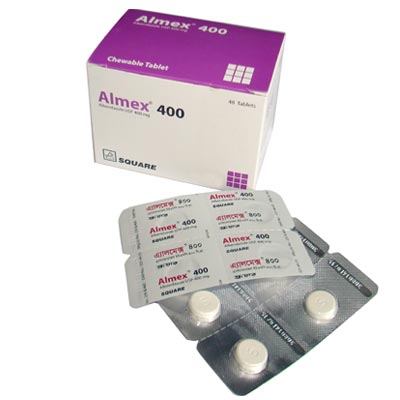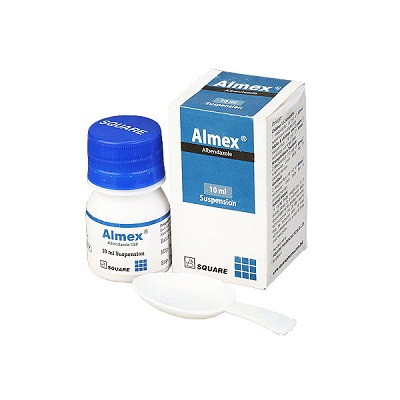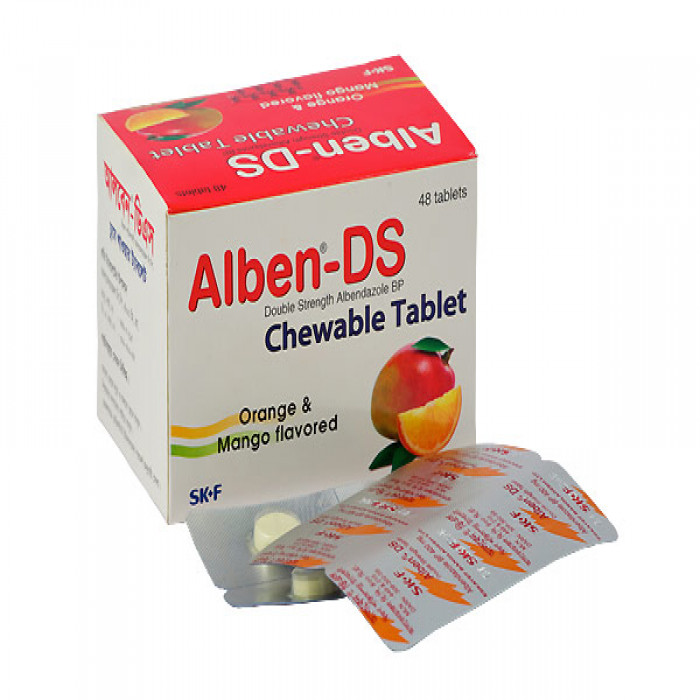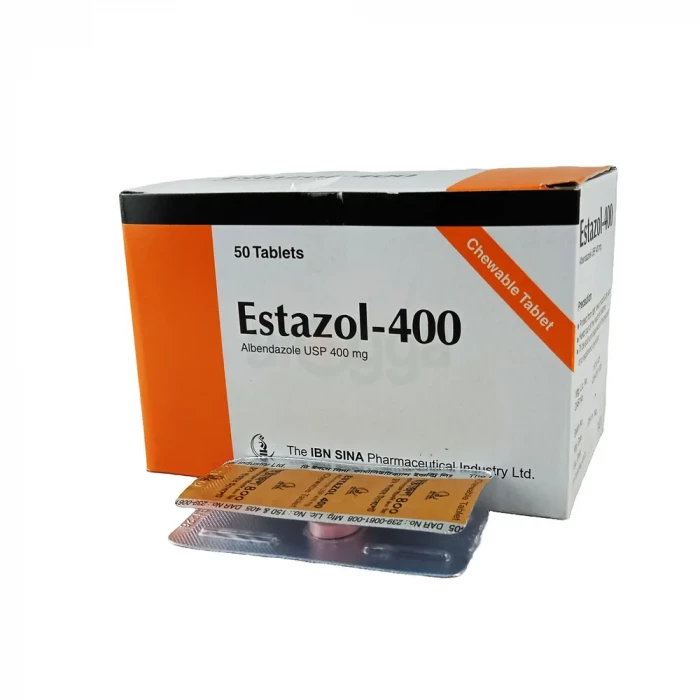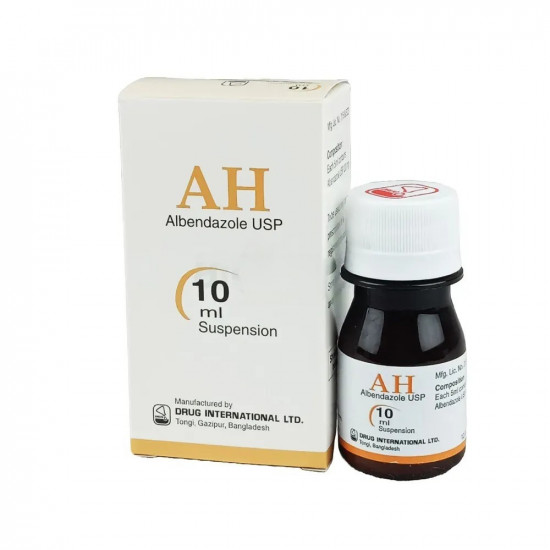
✔ 100% Authentic Product
👁️ Currently Viewing 1089
Albendazole is used to treat parasitic worm infections of the intestines and some other organs. It is also effective against individual unicellular organisms (protozoal infections, ex., Giardia) and belongs to a class of medicines called ‘Anti-helminthics.’
Discount
Price: ৳ 9
MRP:
৳
10.04
6%
Off

100% Genuine Products, Guaranteed

Safe & Secure Payments, Always

Fast, Secure & Efficient Delivery

Proper Packaging
 Cash on Delivery - All over Bangladesh
Cash on Delivery - All over Bangladesh Regular Delivery - 12-24 Hours, Dhaka City* Charge Tk.39-59
Regular Delivery - 12-24 Hours, Dhaka City* Charge Tk.39-59 Regular Delivery - 24-48 Hours, Other Cities* Charge Tk.99-110
Regular Delivery - 24-48 Hours, Other Cities* Charge Tk.99-110
 ফ্রি ডেলিভারিঃ - ৯৯৯ টাকা+ অর্ডারে, ঢাকা
শহরে
ফ্রি ডেলিভারিঃ - ৯৯৯ টাকা+ অর্ডারে, ঢাকা
শহরে ফ্রি ডেলিভারিঃ - ২৯৯৯ টাকা+ অর্ডারে, ঢাকার
বাহিরে
ফ্রি ডেলিভারিঃ - ২৯৯৯ টাকা+ অর্ডারে, ঢাকার
বাহিরে
100% Genuine Products, Guaranteed
Safe & Secure Payments, Always
Fast, Secure & Efficient Delivery
Proper Packaging
 Cash on Delivery - All over Bangladesh
Cash on Delivery - All over Bangladesh Regular Delivery - 12-24 Hours, Dhaka City* Charge Tk.39-59
Regular Delivery - 12-24 Hours, Dhaka City* Charge Tk.39-59 Regular Delivery - 24-48 Hours, Other Cities* Charge Tk.99-110
Regular Delivery - 24-48 Hours, Other Cities* Charge Tk.99-110 ফ্রি ডেলিভারিঃ - ৯৯৯ টাকা+ অর্ডারে, ঢাকা
শহরে
ফ্রি ডেলিভারিঃ - ৯৯৯ টাকা+ অর্ডারে, ঢাকা
শহরে ফ্রি ডেলিভারিঃ - ২৯৯৯ টাকা+ অর্ডারে, ঢাকার
বাহিরে
ফ্রি ডেলিভারিঃ - ২৯৯৯ টাকা+ অর্ডারে, ঢাকার
বাহিরে
✅ Description:
Albendazole is used in the treatment of a wide range of intestinal and systemic helminthic infections, including:
- Roundworm (Ascariasis)
- Tapeworm (Taeniasis)
- Pinworm (Enterobiasis)
- Hookworm (Ancylostomiasis)
- Threadworm (Strongyloidiasis)
- Whipworm (Trichuriasis)
- Chinese liver flukes (Clonorchiasis, Opisthorchiasis)
- Giardiasis (parasitic infection of the intestines, causing stomach pain and diarrhea)
- Cutaneous Larva Migrans (skin infection caused by hookworm larvae)
- Systemic helminthic infections (infections affecting organs beyond the gut)
Serious Infections:
Cystic echinococcosis (hydatid disease, caused by Echinococcus granulosus) – commonly affects the liver and lungs, may also involve brain, kidneys, and muscles.
Alveolar echinococcosis (caused by Echinococcus multilocularis) – primarily affects liver but can spread to spleen, lungs, and brain. Albendazole is often used as supportive therapy with surgery.
Neurocysticercosis (seizures and cyst formation in the brain due to pork tapeworm Taenia solium).
✔️ Mode of Action
Albendazole works by inhibiting glucose uptake in parasites, depleting their energy stores. This leads to impaired survival and eventual death of the parasite.
✔️ Dosage Guidance
Take as prescribed by the physician.
Overdose symptoms: Nausea, vomiting, abdominal cramps, diarrhea, dizziness, seizures, fatigue, and sleep disturbance. Immediate medical care is required.
Missed dose: Take as soon as remembered, but skip if it’s almost time for the next dose. Do not double the dose.
✔️ Side Effects
Common:
- Headache, dizziness
- Nausea, vomiting, abdominal pain, diarrhea
- Fever
- Elevated liver enzymes
- Hair thinning or hair loss (reversible)
Uncommon/Rare:
- Rash, itching, skin reactions (blisters, redness)
- Decreased white blood cells (leukopenia)
- Liver dysfunction or hepatitis
- Bone marrow suppression (rare: pancytopenia, aplastic anemia, agranulocytosis)
✔️ Drug Interactions
Anti-seizure drugs: Carbamazepine, Phenytoin, Phenobarbital (reduce Albendazole effectiveness).
Cimetidine (antacid): May increase drug levels.
Praziquantel: May enhance Albendazole action.
Dexamethasone: Increases Albendazole concentration.
Ritonavir: May alter metabolism.
With Food:
Must be taken with food (preferably fatty meals) to improve absorption.
Avoid grapefruit juice, as it alters drug levels.
✔️ Contraindications
Known hypersensitivity to Albendazole or any excipient of the formulation.
Should not be used during pregnancy unless clearly necessary.
✔️ Precautions & Warnings
Pregnancy: Avoid use (Category C). May harm the fetus.
Breastfeeding: Insufficient data; best avoided.
Driving/Operating Machinery: Avoid if dizziness or tiredness occurs.
Alcohol: Should be limited, as both alcohol and Albendazole may increase the risk of liver damage.
Medical Supervision: Regular monitoring of blood counts and liver function tests is recommended during long-term therapy.
Caution in patients with:
- Seizures or neurocysticercosis
- Pre-existing liver disease
- Bone marrow suppression
⚠️Disclaimer:
At ePharma, we’re committed to providing accurate and accessible health information. However, all content is intended for informational purposes only and should not replace medical advice from a qualified physician. Please consult your healthcare provider for personalized guidance. We aim to support, not substitute, the doctor-patient relationship.




